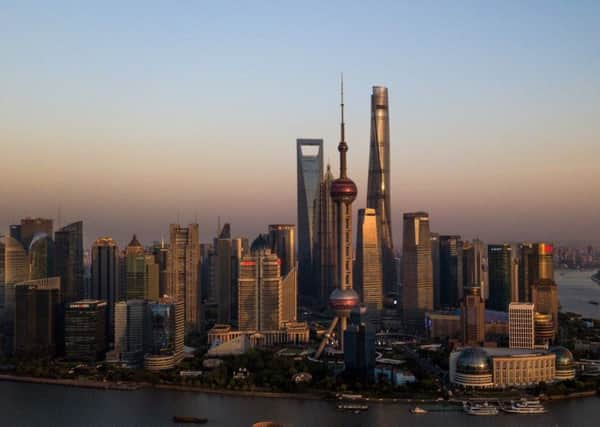Kenny MacAskill: The Empire of the West is falling


However, having been in Asia a few years back, I realise that the West is being supplanted by the East. Visiting Shanghai and seeing Pudong from the Bund made Manhattan seem small and likewise in Tokyo, where the sheer scale of the place dwarfs all of the Big Apple, not just its Manhattan core.
Seeing those cities made me realise that I’d seen the future, for Asia is rising, as sure as the West is declining. It’s not just in the physical buildings but in trade. Having stood in Singapore and watched container ships passing through the Straits of Malacca, it put the English Channel into the shade, not just through the sunshine but by the shadow of the ships on the skyline.
Advertisement
Hide AdAdvertisement
Hide AdNor is it just China and Japan, but other nations – Malaysia, Indonesia and many more – whose economies are growing. Of course, in many ways it’s just a return to normality, as other than the last century, China has always been the world’s largest economy and the sheer scale of population allied with globalisation makes other changes inevitable. Even the United States has pivoted to Asia, with the rise in Pacific and decline in Atlantic interests.
Recently I’ve been watching some remarkably good history programmes and they show that whether it’s Rome or the Ottomans, all empires fade and the same is happening with the dominance of the West, both Europe and America. It won’t be quick or sharp but the turn is on economically as it has been for a while.
Despite that reality and indeed inevitability, the dream of Brexiteers was that the golden age of the British Empire could be resurrected by leaving the EU, cutting out the middleman and trading directly with that global entrepot. That has been shown to be as false as the promises made to Windrush arrivals. Bountiful trade deals there are none, a revived Commonwealth there is not and the warning signs of what reality might really be there are plenty.
Whatever comments President Trump makes to his pal Nigel Farage, there’s nothing there so far and there’s always the threat of chlorinated chicken, the privatisation of the NHS or whatever other unpalatable demands are made by the US in trade deal talks. Meanwhile, the Commonwealth, as shown by India, has hardly been rushing to strike deals, realising that their economic interests rest elsewhere and being equally mindful of past British Empire arrogance.
No wonder that for all his airmiles, Liam Fox, the International Trade Secretary, hasn’t clocked up one deal so far and there’s little sign of any on the horizon. What an abject fool and failure the man is. Yet still the Brexiteers persist on leaving the Customs Union and Theresa May talks about some mythical Customs Partnership that’s ill thought out and already discredited by the EU.
The UK Government aren’t just delusional in their dreams but ignore the realities of existing trading arrangements with Asia in two aspects. Firstly, how hard it was to achieve in the first place. The EU, with its combined power, struggled to come to an agreement with China, which is notoriously difficult to deal with. Any business person who has worked there has expressed frustration at the complexity and bureaucracy that exists. It’s not just language but cultural barriers, and also deliberate political obstruction. The idea that the UK was just going to roll up and doors would automatically open was absurd. Re-writing that would be impossible and the idea that a better deal could be obtained when German trade, never mind the combined EU 27, is far larger than the UK’s is ridiculous.
Secondly, they ignored the warnings that were given even before the Brexit vote. David Cameron was warned by the Japanese Premier of the risk of withdrawal of investment and that has been reiterated now that the vote has taken place by the ambassador. Just a few weeks back, the Land of the Rising Sun’s representative made it clear that losing tariff-free access could be the setting of the sun for Japanese investment, pointing out that 40 per cent of Japanese investment into the EU goes to the UK but it was dependent on tariff-free access to the continent.
Japan currently invests £46.5 billion into the UK, supporting 160,000 jobs and not just car manufacturers like Nissan, Honda and Toyota but banks, technology and life science companies, as Scotland knows only too well. All that, he explained, could go as 80 per cent of the cars are for export. As Britain can’t even resolve the Irish border issue with its first colony, just how does it expect to retain the tariff-free access demanded for the EU? It seems impossible.
Advertisement
Hide AdAdvertisement
Hide AdThe East is rising and trading with them is essential. However, being part of the EU offered opportunities and advantages. It gave collective scale not just to negotiate trade deals with them but politically to try and carve a third way between Asia and America. Protecting the welfare state is proving hard enough within the current EU and that will be more difficult outwith it. It means nothing to those like Dr Fox who dream of the UK as some Far East entrepot with few if any protections for the poor or vulnerable. It will mean a lot to many others who were deluded by false promises, sold a pup and now risk unemployment and penury.
Trade with the East is the future but it’s best achieved within the EU. The UK was the preferred gateway for access to Europe, as well as being the most important place for investment – the City of London and the English language helping to ensure that. Being in the Customs Union, or as near as damn it, is essential for us and our Asian trading partners.
